SUBSCRIPT: $7 million to one law firm is not a 'budget buster' when CPS faces another 'deficit' according to the Sun-Times...And the winner is... Jim Franczek?
You'd think that when a public school system claims that it's broke and needs to steal from, among others, its honored retired veterans while closing schools even though it doesn't save any real money by closing schools, there would be some shame in paying an outside lawyer millions of dollars a year for legal work. This may especially be true when that legal work is also being done by some of the lawyers the school system has in its $10 million in-house law department.
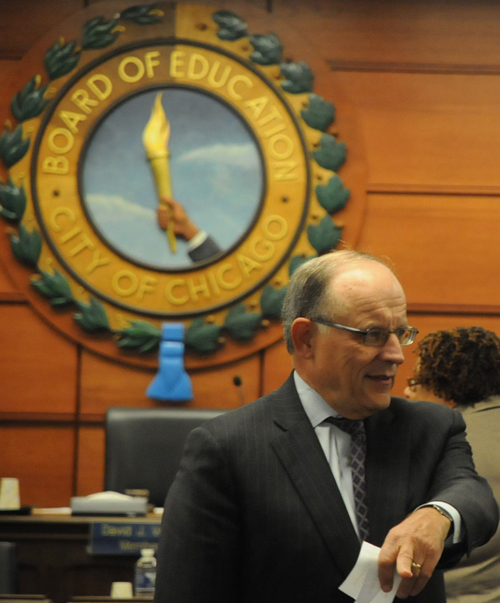 CPS labor lawyer James Franczek took the time to salute Substance as he left during a recent Board of Education meeting. Substance photo by George N. Schmidt. Welcome to the world of Chicago Spin, specifically the pinstripe patronage that abounds across the city while municipal budgets are supposedly "broke."
CPS labor lawyer James Franczek took the time to salute Substance as he left during a recent Board of Education meeting. Substance photo by George N. Schmidt. Welcome to the world of Chicago Spin, specifically the pinstripe patronage that abounds across the city while municipal budgets are supposedly "broke."
In Spin City, paying one outside law firm millions of dollars while maintaining a supersized in-house Law Department is no bar to another round of Orwellian journalism, courtesy of the Chicago Sun-Times. According to a new post-strike analysis and editorial by the Sun-Times, the motto might be "Millions for lawyers, but not a cent for teachers."
By the way, the Sun-Times total for CPS payments to Franczek Radelete as of June 2012 was: $6.74 million. But that's incomplete.
At its regular monthly meeting the end of June, the Board voted another $600,000 to Franczek Radelete, adding to the previous total. And if past practice is any guide to the future, at its October 24, 2012 meeting, the Board will be approving another half million or more to Franczek Radelet.
By the time the Chicago Teachers Union leadership had dotted all the i's and crossed all the t's along the lines established in the law that discriminated against the CTU (and which many bragged would make it impossible for CTU to strike), Jim Franczek was definitely earning his pay at the bargaining table. But that was partly because at his sides during the ten months it finally took to get a contract with the union was a Bozo's Circus of overpaid incompetence.
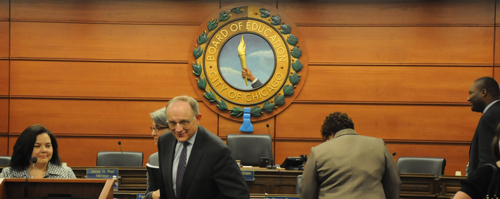 While the negotiations on the Chicago teachers contract were being conducted under the leadership of attorney James Franczek (above center), the Board of Education's quarter million dollar per year "Chief Executive Officer" Jean-Claude Brizard (above right) did not spend one session at the bargaining table, even after CPS strategy and tactics provoked the first CTU strike in a quarter century. The problems that led to the strike were due in part to the fact that CPS has been playing "Management Musical Chairs" since Mayor Rahm Emanuel took over in May and June 2011. Brizard's "team" has changed more than a dozen key executives (most recently, the "Chief Financial Officer") in the past six months, while the Chicago corporate media covers up the massive incompetence at the top. Ironically, during the recent contract negotiations with the teachers, the very expensive outside lawyer, Jim Franczek (above center) was one of the few people who was constant at the table and knew what was going on and what was at stake. In the middle of the negotiations, CPS lost its Chief Labor Relations Officer Rachel Resnick (above behind Franczek) to retirement and made no effort to keep her for the remainder of the negotiations. After the strike became immanent, CPS added Board President David Vitale, the newly arrived "Chief Education Officer" Barbara Byrd-Bennet (most recently, Detroit), and mayoral assistant Beth Swanson to the "bargaining team." Substance photo by George N. Schmidt. Despite all the fatuous press releases and silly assurances by the "Where's Waldo" Chief Executive Officer" of the nation's third largest school system (Jean-Claude Brizard, handpicked by Rahm Emanuel) it was chaos at the top.
While the negotiations on the Chicago teachers contract were being conducted under the leadership of attorney James Franczek (above center), the Board of Education's quarter million dollar per year "Chief Executive Officer" Jean-Claude Brizard (above right) did not spend one session at the bargaining table, even after CPS strategy and tactics provoked the first CTU strike in a quarter century. The problems that led to the strike were due in part to the fact that CPS has been playing "Management Musical Chairs" since Mayor Rahm Emanuel took over in May and June 2011. Brizard's "team" has changed more than a dozen key executives (most recently, the "Chief Financial Officer") in the past six months, while the Chicago corporate media covers up the massive incompetence at the top. Ironically, during the recent contract negotiations with the teachers, the very expensive outside lawyer, Jim Franczek (above center) was one of the few people who was constant at the table and knew what was going on and what was at stake. In the middle of the negotiations, CPS lost its Chief Labor Relations Officer Rachel Resnick (above behind Franczek) to retirement and made no effort to keep her for the remainder of the negotiations. After the strike became immanent, CPS added Board President David Vitale, the newly arrived "Chief Education Officer" Barbara Byrd-Bennet (most recently, Detroit), and mayoral assistant Beth Swanson to the "bargaining team." Substance photo by George N. Schmidt. Despite all the fatuous press releases and silly assurances by the "Where's Waldo" Chief Executive Officer" of the nation's third largest school system (Jean-Claude Brizard, handpicked by Rahm Emanuel) it was chaos at the top.
The "team" Rahm constantly talked about was a mess, and changes after March 2012 made it a bigger mess.
CPS had been playing "Management Musical Chairs" the whole time it wasn't playing "Management by Publicity Stunt" in a pas de deux with Rahm Emanuel. Both were very expensive.
One of the reasons why CPS had such a difficult time in negotiations this year was that the Board of Education played musical chairs on its side of the bargaining table. CPS replace Rachel Resnick (Chief of Labor Relations) with Joe Moriarity in June. After months with Tim Cawley being the main guy on the Board's side of the table, suddenly a very expensive new bureaucrat arrived from Detroit and pulled up to join the "bargaining team" — FNG "Chief Education Officer" Barbara Byrd-Bennett. And during the whole time, the quarter million dollar "Chief Executive Officer was not — that is NOT as in NEVER — at the table. Finally, as the negotiations wound down to a stalemate and the strike was looming, CPS added David Vitale (President of the Board) and Beth Swanson (a mayoral bureaucrat) to the "team". By the time the teachers went on strike on September 10, 2012, James Franczek was the only person who had been at bargaining the entire time, from November 2011 on.
But in Chicago, that's not "news." Nor is it a crazy example of overspending.
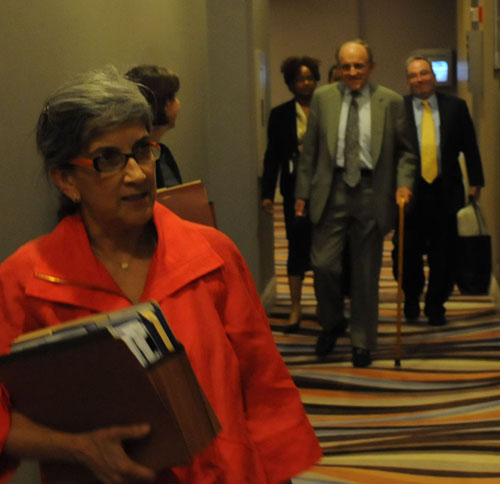 The first meetings between the new CTU leadership and the Board of Education's labor team actually began in August 2010 (above). Two months after Karen Lewis and the CORE team were elected to lead the CTU, a meeting was held at the Holiday Inn Mart Plaza (above) between CTU officials and the CPS team (above). Above, left to right are Board Chief Labor Relations Officer Rachel Resnick, Franczek Radelet lawyer Stephanie Donovan, Board lawyer Cheryl Colson, James Franczek, and Board lawyer Joe Moriarity. Substance photo by George N. Schmidt. Here is the stories (grammar deliberate):
The first meetings between the new CTU leadership and the Board of Education's labor team actually began in August 2010 (above). Two months after Karen Lewis and the CORE team were elected to lead the CTU, a meeting was held at the Holiday Inn Mart Plaza (above) between CTU officials and the CPS team (above). Above, left to right are Board Chief Labor Relations Officer Rachel Resnick, Franczek Radelet lawyer Stephanie Donovan, Board lawyer Cheryl Colson, James Franczek, and Board lawyer Joe Moriarity. Substance photo by George N. Schmidt. Here is the stories (grammar deliberate):
On October 8, 2012, the Sun-Times treated its readers to a one-two punch of propaganda and spin. In an editorial, the Sun-Times repeated all the usual lies about how broke CPS is, and how bad things will be if the fiscal house is not straightened out by, among other things, closing schools and once again stealing from teachers' pensions. A few pages earlier, in the same edition, the same newspaper ran a news story singing the praises of a CPS policy that is costing the school system millions of dollars — for an outside law firm. Only in Chicago could such a bizarre variation on the facts be spun and somehow spin out of control without anyone screaming. During the Reign of Rahm, spin is in. First, there was the news story about Jim Franczek:
RAHM EMANUEL'S GO-TO GUY ON LABOR
Rahm Emanuel’s go-to guy on labor: Leave ‘no footprints’ By DAN MIHALOPOULOS Staff Reporter dmihalopoulos@suntimes.com October 8, 2012 1:34AM
James Franczek is the chief labor lawyer for City Hall, the city’s public schools, the parks system, City Colleges and the city-state agency that runs Navy Pier and McCormick Place — units of government that collectively have paid his firm, Franczek Radelet, $16.47 million since Jan. 1, 2005, records show. Here’s a breakdown:
◆ Chicago Public Schools — $6.74 million
◆ City of Chicago — $5.10 million
◆ Metropolitan Pier and Exposition Authority — $2.41 million
◆ City Colleges — $1.20 million
◆ Chicago Park District — $1.01 million
A s one of the key people Mayor Rahm Emanuel turns to in many of his toughest spots, James Franczek played a major role in the deal that ended the first Chicago teachers strike in 25 years.
Franczek’s work in winning concessions from labor unions at McCormick Place was instrumental in the decision to keep two major trade shows in Chicago.
Now, he has a central role for City Hall in the ongoing negotiations with the police and firefighters unions for new contracts.
Emanuel booted out and replaced many other top advisers to former Mayor Richard M. Daley. But he kept Franczek, who finds himself pushing to roll back many of the improved job benefits for unionized employees that he helped establish at Daley’s behest.
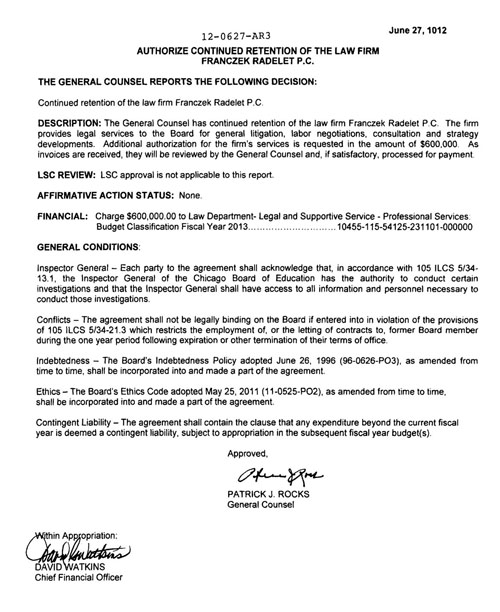 After the Sun-Times compiled its tally of the amount CPS had paid to Franczek Radelet, the Chicago Board of Education, without discussion or debate, approved paying the firm another $600,000 at its June 27, 2012 meeting. This brings the total during the time reported by the Sun-Times to more than $7 million from CPS. Graphic: From Chicago Board of Education, Actions (cps.edu, Board of Education, June 27, 2012). Franczek is the chief labor lawyer for the Emanuel administration, the Chicago Public Schools, the Chicago Park District, the City Colleges and the Metropolitan Pier and Exposition Authority, the agency better known as McPier that operates the McCormick Place convention center and Navy Pier.
After the Sun-Times compiled its tally of the amount CPS had paid to Franczek Radelet, the Chicago Board of Education, without discussion or debate, approved paying the firm another $600,000 at its June 27, 2012 meeting. This brings the total during the time reported by the Sun-Times to more than $7 million from CPS. Graphic: From Chicago Board of Education, Actions (cps.edu, Board of Education, June 27, 2012). Franczek is the chief labor lawyer for the Emanuel administration, the Chicago Public Schools, the Chicago Park District, the City Colleges and the Metropolitan Pier and Exposition Authority, the agency better known as McPier that operates the McCormick Place convention center and Navy Pier.
As of the end of June — months before the teachers’ contract negotiations ended — the school system had paid Franczek’s firm more than $6.7 million since the beginning of 2005, records show.
Over the same period, City Hall has paid the firm more than $5.1 million, with Franczek billing $295 an hour for his services.
In all, City Hall, the schools, the parks, the City Colleges and McPier have paid him and his firm nearly $16.5 million since 2005.
So how come more people don’t know him?
“My role is not to leave any footprints in the sand, all right?” Franczek says in his 34th-floor office on South Wacker Drive. “My role is to carry out the mission, the vision of the leaders I work for — Mayor Emanuel and, before him, Mayor Daley. I’m not an independent policy-maker. I’m an implementer of policy.”
Franczek, 65, has been the point man for the city school system in labor talks since 1994. The following year, Daley hired his firm — Franczek Radelet — to represent City Hall, too.
In March, the Emanuel administration extended his firm’s deal, specifying that Franczek Radelet will represent City Hall in talks with unions representing the city’s office workers, firefighters and police officers, as well as in such critical legislative matters as employee pensions.
Keeping Franczek was an easy decision, says Emanuel’s former deputy mayor, Mark Angelson.
“Jim Franczek is, by far, the best management-side labor lawyer I have met or worked with in my life,” says Angelson, who was a corporate CEO before his stint at City Hall.
Gery Chico, a Chicago school board president under Daley, says he “came to rely upon his counsel very heavily.”
“He is a problem solver,” Chico says. “He is not one of those ideologues.”
On the other side of the negotiating table, Karen Lewis, the fiery Chicago Teachers Union president, praises Franczek for his vast experience and says she felt he respected the collective-bargaining process.
“He is friggin’ brilliant for the management side,” says Lewis.
Franczek began to practice government labor law in the suburbs. Things sometimes grew heated. Once, in the 1980s, he says, a Chicago Heights police officer pulled a gun on him during negotiations.
Franczek usually prefers to laugh off the hard feelings his work often generates. His office is adorned with a photo of a man waving a “Franczek Sucks” sign. “That’s one of my buddies in the police union,” he jokes.
He says he appreciates the importance of compensation and benefits to public employees and retired public workers. Still, he predicts “watershed change in the schools, as well as city government,” under Emanuel.
“The guy has got enormous energy and enormous leadership and the will to make changes on things that are extremely difficult and extremely sensitive,” Franczek says of the mayor.
The son of immigrants from Poland and Lithuania, Franczek grew up in Harvey and attended the University of Notre Dame and the University of Chicago’s law school. He and his wife live in Hyde Park and also own homes in Longboat Key, Fla. (appraised value: $1.29 million), and near the Indiana Dunes ($651,300).
A spokesman of the city Law Department says Franczek and his firm “are paid at a competitive rate and are used only on an as-needed basis.”
Franczek says his experience and relationships with labor leaders mean his firm’s work for government, though costly, is a good deal for taxpayers: “The bang for the city buck is unequaled.”
Contributing: Art Golab
Now read the editorial:
Sun-Times editorial October 8, 2012.
Now, read the editorial [Noting that the budget doesn't need to reign in outside lawyers' costs]:
Editorial: CPS must get serious about budget cuts. Editorials October 7, 2012 4:14PM. Updated: October 8, 2012 2:17AM
Tomorrow has arrived for the Chicago Public Schools.
For more than a year, the new schools leadership has put off a set of excruciating decisions about its precarious financial future.
Inking a deal with the teachers took precedence. As we now know, getting that resolved took every last bit of energy and focus.
But time is now up. The era of one-time tricks, limping along and wishful thinking must end.
Next year’s estimated deficit is $1 billion, swamping this year’s $665 million hole. Fiscal year 2014 will bring an estimated $1.3 billion deficit. This is against an operating budget of only $5.2 billion.
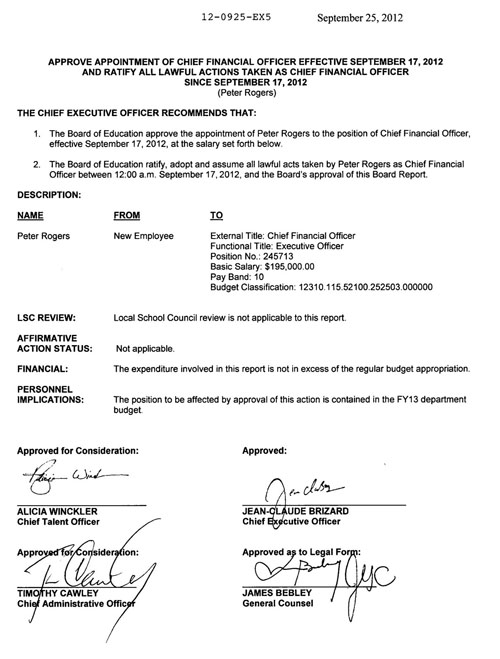 A major example of the Bozo's Circus of management at CPS came between the June 2012 vote to pay the additional $600,000 to the Franczek law firm and the most recent Board meeting, which took place on September 25, 2012. Not that the Board on September 25, 2012 (above) replaced its former "Chief Financial Officer" (a guy named David Watkins, who had been in officer less than 18 months) with another guy from outside (Peter Rogers, in the above Board report, which authorizes paying him $195,000 per year). While the Chicago Sun-Times and other corporate media carp about how CPS has to close schools and screw retired teachers out of pensions, no mention is made of the fact that the current CPS administration is the most incompetent in history, with people being changed literally every month. The lowering of the CPS bond ratings by the controversial rating agencies (Moody's, Standard and Poors and Fitch help bring about the 2008 financial collapse of much of capitalism by rating worthless derivatives as "AAA", just as they had praised Enron and other corrupt corporations a decade earlier) did not bother to mention that most of the financial officials at CPS have been in office less than two years, and the the Chicago Board of Education quietly purged the last people who knew the schools system's complex finances during the "administrative cuts" ordered by Rahm Emanuel in 2011. A series of sober rating agencies are on the warpath. Since last summer, when CPS balanced this year’s budget by draining its reserves, three separate agencies have downgraded its credit rating. Since last October, Moody’s Investors Service has downgraded CPS on three occasions.
A major example of the Bozo's Circus of management at CPS came between the June 2012 vote to pay the additional $600,000 to the Franczek law firm and the most recent Board meeting, which took place on September 25, 2012. Not that the Board on September 25, 2012 (above) replaced its former "Chief Financial Officer" (a guy named David Watkins, who had been in officer less than 18 months) with another guy from outside (Peter Rogers, in the above Board report, which authorizes paying him $195,000 per year). While the Chicago Sun-Times and other corporate media carp about how CPS has to close schools and screw retired teachers out of pensions, no mention is made of the fact that the current CPS administration is the most incompetent in history, with people being changed literally every month. The lowering of the CPS bond ratings by the controversial rating agencies (Moody's, Standard and Poors and Fitch help bring about the 2008 financial collapse of much of capitalism by rating worthless derivatives as "AAA", just as they had praised Enron and other corrupt corporations a decade earlier) did not bother to mention that most of the financial officials at CPS have been in office less than two years, and the the Chicago Board of Education quietly purged the last people who knew the schools system's complex finances during the "administrative cuts" ordered by Rahm Emanuel in 2011. A series of sober rating agencies are on the warpath. Since last summer, when CPS balanced this year’s budget by draining its reserves, three separate agencies have downgraded its credit rating. Since last October, Moody’s Investors Service has downgraded CPS on three occasions.
The agencies cited the draining of reserves, increasing pension costs, the district’s above-average debt burden, and, in two downgrades in the last two weeks, the expense of the new teachers contract.
On Friday, CPS revealed how it will cover $103 million in new costs this year tied to the contract — and it doesn’t signal a new day. No cuts are supposed to touch the classroom, a positive, but CPS will pull this off by continuing its practice of pushing off debts into the future. CPS will get the bulk of the savings, $55 million, by extending certain debt payments over a longer period of time and borrowing to make other debt payments. Not only does this delay the inevitable, but it almost certainly increases CPS’ total debt, even if it’s refinanced at a lower rate.
CPS also will keep trimming administrative costs to find $103 million in savings. The deeper and longer they dig, they say, the more they find.
That cost-cutting work must be CPS’ singular focus going forward.
In the last few years, the board has managed to pull several rabbits out of a hat, most notably by deferring hundreds of millions in pension payments and scoring extra cash from the federal government.
There are no rabbits left. Schools officials are expected to lay out a long-term financial plan in the near future. It must be both brutally honest and, while covering all aspects of the budget, home in on two top priorities:
† Cutting pension costs: For years, CPS diverted money from the teachers pension fund to pay operating costs. When that pension bill finally came due, CPS had no way to pay for it. In 2010, as the economic downturn droned on, CPS won a three-year pension holiday from the state. That ends next year, resulting in a $338 million spike in pension costs.
CPS cannot, and never could, afford the pensions it has promised. The city has the same problem, and Mayor Rahm Emanuel is aggressively seeking a solution. Last May, he pitched an unpopular but desperately needed plan for cutting pension costs to the state Legislature, which by law sets pension terms. As the Civic Federation recommends, the board of education should do the same, laying out possible changes for current employees and retirees — including a higher retirement age, greater contributions and a lower cost-of-living adjustment in retirement.
† Closing schools: CPS says 50 percent of its schools are underused.
As we’ve said repeatedly, CPS, in concert with Chicago’s neighborhoods, must craft a long-term plan to reduce costs by consolidating and closing schools. Rich public disclosure of details is a must — how much might be saved, how the schools will be chosen — before any decisions are made.


By: nHSNiMg
everyday cialis coupon
Lyman QWTtNFaiUsKmqu 6 18 2022 buy cialis 5mg daily use